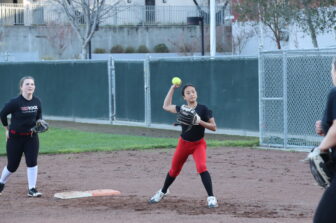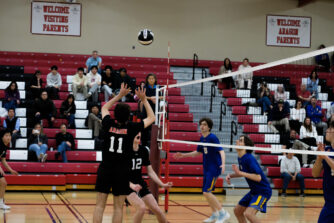
Many athletes depend on sports, but some people miss chances to get noticed by college coaches due to their lack of knowledge about college recruiting.
Colleges have certain periods for different steps of the recruiting process. During the contact period, coaches meet the athlete or their parents in person, watch their competitions and contact the athlete via email or telephone. In the evaluation period, colleges watch athletes compete, but can only message them through phone rather than phone and email.
During the quiet period, coaches are not allowed to scout players off their college campus, but are still allowed to contact college-bound students on campus and via phone. Dead periods allow coaches to message an athlete committed to their college only through phone.
Because there are fewer college recruiters than prospective athletes, prospective recruits must seek out recruiters.

“Just get yourself out there, email as many schools as you can because you don’t want to limit your list too early [and] keep it broad,” said senior Ally Thaw, who is committed to Lehigh University through a volleyball scholarship. “When you’re 14 or 15, you’re not going to know what you want in three years. A lot of people change from between when they’re 14 to 18.”
Coaches may not have much free time in their lives, and often fail to reply to emails or pick up phone calls.
“Just try to reach out to the college coaches first and just keep emailing them and calling them if you can, even if they’re not responding,” said senior Marisa Laird, a gymnast committed to the University of California, Davis. “The more you email them, the more they see your name, the more they’ll be interested.”
Attending college ID camps and making frequent college visits is another way to get noticed.
“I started talking to the Davis coaches probably junior year, or somewhere before junior year, and then I just sent them videos every few weeks, and they came to my competitions,” Laird said. “I went to their high performance camps during the summer and went to their official visit. Eventually they offered.”
Standing out in a sea of other talented athletes can be difficult.
“What I did to get noticed was I just went to one of the UCLA camps and after that they invited me back, but for everyone, it’s all different how you get recruited,” said sophomore Megan Grant, a softball player with a verbal commitment to UCLA. “My advice is to always hustle, have a great attitude and body language, and be a great teammate.”
There are lucky cases where college scouts are present at an athlete’s practice or significant competitions and evaluate them.
“You just need to show a lot of personality on the court,” Thaw said. “That will draw coaches to you.”
The National Collegiate Athletic Association’s rules restrict college coaches from speaking with athletes before their junior year. However, athletes can unofficially commit to colleges by agreeing with a verbal commitment. A verbal commitment can be made anytime, and is made before an athlete signs a National Letter of Intent.
A National Letter of Intent is the official commitment between an athlete and a Division I or II college. The athlete is guaranteed acceptance and one financially aided academic year.
Once the letter is signed, the athlete’s recruiting process is finished, and outside colleges are no longer allowed to recruit them. To be eligible for any recruitment, the athlete must have an acceptable grade point average of 2.3.
It’s normal for young athletes to want to spend time with their friends and attend school events, but it can be difficult when they also have practices and tournaments planned. They may not end up with a lot of free time and can miss social events.
“I missed junior prom, I mean, basically, club season is all of second semester, you basically don’t get a social life,” Thaw said. “But honestly, I definitely wouldn’t trade it for anything because it’s brought me so much happiness and joy.”
Athletes interested in playing for a college need to reach out to coaches as well as take advantage of contact periods. Persistence and dedication will eventually lead to success.



